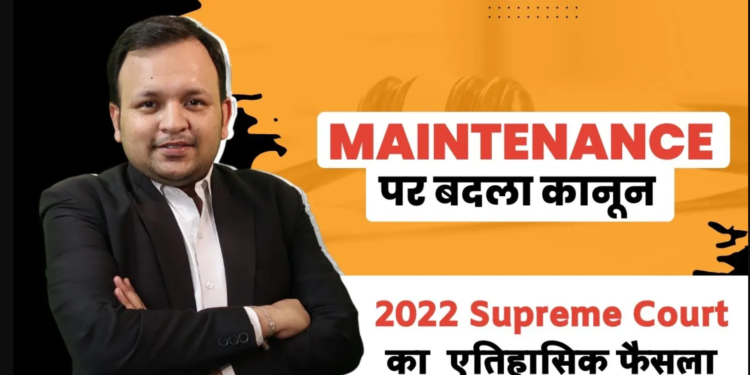Introduction:
In disputes between spouses, the matter of maintenance often takes centre stage. Section 125 of the Criminal Procedure Code (CRPC) allows a wife to seek maintenance when she’s unable to sustain her lifestyle, and she may not wish to live with her husband due to cruelty or other valid grounds. This leads to a legal process where notices are sent, evidence is presented, and the family court issues orders based on Section 125 CRPC, granting maintenance to the wife. In some cases, interim maintenance is provided while the application is pending, ensuring financial support during the legal proceedings.
Now, let’s delve into the pivotal 2022 Supreme Court judgement that clarified how a husband’s income is evaluated for maintenance.
Landmark Judgment of Anju Garg vs. Deepak Kumar Garg (28th September 2022)
Brief Facts of the Case:
In this case, marital disputes led the wife to leave her husband’s house. She filed an application under Section 125 of the CRPC, stating that she left due to her husband’s cruelty and took her children with her. With three family members depending on her husband for their livelihood, she sought maintenance.
After hearing the wife’s plea, the family court sent a notice to the husband, summoned him, and ultimately ruled that the wife would not receive any maintenance. The reason provided was that the husband presented evidence claiming he had no income to support his wife and children. The application from the wife was dismissed. Regarding the daughter, as she was above 18 years of age (a major), no maintenance was granted. However, for the son, who was under 18, the court ordered the husband to pay Rs. 6,000 per month until he reached adulthood.
Displeased with this decision, the wife appealed to the High Court, but her appeal was dismissed.
Frustrated with both orders, the wife took her case to the Supreme Court. The Supreme Court, after reviewing both lower court orders, hearing the parties involved, and examining affidavits and evidence, embarked on an important analysis of Section 125 CRPC regarding its objective.
The objective of Section 125 CRPC is to compel a husband to maintain his wife and children when they are unable to support themselves. The Supreme Court questioned the family court’s initial denial of the wife’s petition, given the husband’s argument that he couldn’t earn or provide maintenance to his wife.
Final Judgement:
The Supreme Court held that a husband is duty-bound to pay maintenance to his wife and children, even in the absence of regular income. The key distinction lies in the husband’s capability to earn rather than his willingness to do so. If a husband has the capacity to earn but chooses not to, it is not the wife or anyone else’s responsibility. Not earning without a legitimate reason does not absolve the husband of his legal duty to provide maintenance.
In light of this, the Supreme Court set aside the lower court orders. The husband was directed to pay Rs. 10,000 to his wife and Rs. 6,000 to his son as initially determined. As for the daughter, she was not entitled to maintenance under Section 125 CRPC, as major children are maintained only if they are physically or mentally challenged, as specified by the rules of the section. However, she could explore her rights under the Hindu Adoption and Maintenance Act of 1956.
Conclusion:
The Supreme Court’s verdict in the Anju Garg vs. Deepak Kumar Garg case underscores the obligation of a husband to provide maintenance to his wife and children when he possesses the capability to earn, irrespective of his actual earnings. The judgement clarifies that the willingness to earn is a husband’s personal decision, but the duty to maintain remains a legal obligation. This case sets a significant precedent for maintenance-related disputes and reaffirms the rights of the dependent spouse and children.
For understanding more such complex law in simple ways, stay connected with www.thelegalshots.com .
If doubts still persist, contact our Legal Experts at



